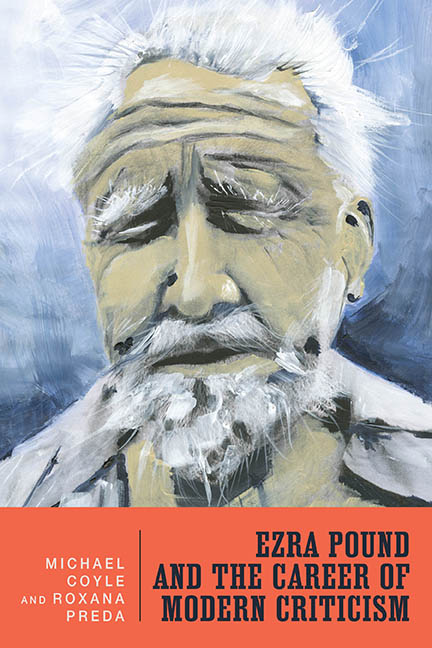Book contents
- Frontmatter
- Dedication
- Contents
- Preface
- Acknowledgments
- 1 From Wabash to Washington, 1907–1947
- 2 A Prize Fight and Institutionalization, 1948–1951
- 3 Kenner, Watts, and Professional Attention, 1951–1961
- 4 Sailing after Knowledge, 1962–1971
- 5 The Pound Era and Its Monumental Companion, 1971–1985
- 6 Pound Studies and the Postmodern Turn, 1980–1990
- 7 Reading Pound in the New Millennium, 1990–2016
- 8 The Many Lives of Ezra Pound: Biographies and Memoirs, 1960–2015
- 9 Educating the World: Periodicals on Ezra Pound, 1954–2017
- Conclusion
- Chronology of the Bollingen Controversy
- Works Cited
- Index
7 - Reading Pound in the New Millennium, 1990–2016
Published online by Cambridge University Press: 17 July 2019
- Frontmatter
- Dedication
- Contents
- Preface
- Acknowledgments
- 1 From Wabash to Washington, 1907–1947
- 2 A Prize Fight and Institutionalization, 1948–1951
- 3 Kenner, Watts, and Professional Attention, 1951–1961
- 4 Sailing after Knowledge, 1962–1971
- 5 The Pound Era and Its Monumental Companion, 1971–1985
- 6 Pound Studies and the Postmodern Turn, 1980–1990
- 7 Reading Pound in the New Millennium, 1990–2016
- 8 The Many Lives of Ezra Pound: Biographies and Memoirs, 1960–2015
- 9 Educating the World: Periodicals on Ezra Pound, 1954–2017
- Conclusion
- Chronology of the Bollingen Controversy
- Works Cited
- Index
Summary
To theorize concepts of “text” purified of the material complexity in which cultural works are located is to imagine the nonexistent or the unimportant. Theory advances not when it codifies empty abstractions, but when it facilitates fuller accounts.
—Lawrence Rainey, Monument of CultureThe Emergence of New Modernist Studies
THE EXPLANATORY EBULLIENCE of Pound studies in 1970s, driven by Kenner's The Pound Era and Terrell's Paideuma, was cut off by the theoretical and political turn of deconstruction, whose ideological critique was strongly felt all through the 1980s. Understanding in detail and structurally relating what Pound had written in his poetry, early and late, ceased to be the priority of the day. The second volume of Terrell's Companion to The Cantos of Ezra Pound, published in 1984, proved to be not only the summing up of the scholarship produced by a whole generation, but the swansong of an era. Source hunting, clarifying allusions, and literary interpretation had become suspect: political facts and attitudes had been swept under the carpet for the sake of aesthetics; Pound scholars were (not innocently) promoting a poet whose moral values were appalling, whose politics was totalitarian, and whose economics was mad. An emphasis on the literary meant a turning away from the ugly truth: no amount of poetic innovation could justify anti-Semitism after the Holocaust. The feeling that Pound had not been properly punished, that he had had it easy at St. Elizabeths and cheated the system of its rightful retribution was running like a silent undercurrent in the detailed ideology critique of the postmodern era. The turn away from purely literary interpretation in the 1980s meant a reorientation towards theoretical tools that could be best used to face up to the scholar's responsibility: to chastise Pound as an anti-Semite, to dismiss his work as fascist.
More generally, postmodernism had critically conceived modernism as part of a binary opposition, and the inferior part at that. Modernism was bad: formalist, essentialist, elitist, fascist, or at least authoritarian, difficult, even abstruse, conservative of cultural values, in short genteel and anti-democratic.1 Modernism was genteel because it was committed to Eurocentric high culture and to the imperative of preserving and contributing to it; racism and sexism had continued, unquestioned; elitism, exclusions, and inhuman politics had been promoted beyond reason.
- Type
- Chapter
- Information
- Ezra Pound and the Career of Modern CriticismProfessional Attention, pp. 133 - 159Publisher: Boydell & BrewerPrint publication year: 2018

